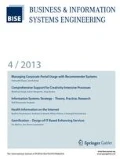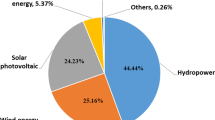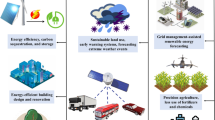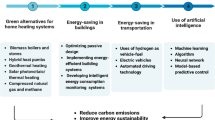Abstract
Due to the increasing importance of producing and consuming energy more sustainably, Energy Informatics (EI) has evolved into a thriving research area within the CS/IS community. The article attempts to characterize this young and dynamic field of research by describing current EI research topics and methods and provides an outlook of how the field might evolve in the future. It is shown that two general research questions have received the most attention so far and are likely to dominate the EI research agenda in the coming years: How to leverage information and communication technology (ICT) to (1) improve energy efficiency, and (2) to integrate decentralized renewable energy sources into the power grid. Selected EI streams are reviewed, highlighting how the respective research questions are broken down into specific research projects and how EI researchers have made contributions based on their individual academic background.

Similar content being viewed by others
References
Appelrath H-J, Kagermann H, Mayer C (eds) (2012) Future energy grid – migration to the internet of energy. Technical report, National Academy of Science and Engineering
Ahn C, Li C-T, Peng H (2011) Optimal decentralized charging control algorithm for electrified vehicles connected to smart grid. Journal of Power Sources 196(23):10369–10379
Anders G, Hinrichs C, Siefert F, Behrmann P, Reif W, Sonnenschein M (2012) On the influence of inter-agent variation on multi-agent algorithms solving a dynamic task allocation problem under uncertainty. In: Proc of 6th IEEE international conference on self-adaptive and self-organizing systems (SASO), Lyon
Aswani A, Master N, Taneja J, Culler D, Tomlin C (2011) Reducing transient and steady state electricity consumption in HVAC using learning-based model predictive control. Proceedings of the IEEE 100(1):240–253
Bodenstein C, Schryen G, Neumann D (2012) Energy-aware workload management models for operating cost reduction in data centers. European Journal of Operational Research 222(1):157–167
Callaway DS, Hiskens IA (2011) Achieving controllability of electric loads. Proceedings of the IEEE 99(1):184–199
Dawson-Haggerty S, Jiang X, Tolle G, Ortiz J, Culler D (2010) SMAP – a simple measurement and actuation profile for physical information. In: Proc of 8th ACM conference on embedded networked sensor systems (SenSys), Zurich
Feldmeier M, Paradiso JA (2010) Personalized HVAC control system. In: Proc of internet of things (IoT) 2010, Tokyo
Feueriegel S, Strüker J, Neumann D (2012) Reducing price uncertainty through demand side management. In: Proc of international conference on information systems (ICIS), Orlando
Flath CM, Gottwalt S, Ilg JP (2012a) A revenue management approach for efficient electric vehicle charging. In: Proc of 45th Hawaii international conference on system sciences, Hawaii
Flath CM, Nicolay D, Conte T, van Dinther C, Filipova-Neumann L (2012b) Cluster analysis of smart metering data. Business Information Systems Engineering 4(1):31–39
Gan L, Topcu U, Low S (2007) Optimal decentralized protocols for electric vehicle charging. IEEE Transactions on Power Systems 6(1):1–10
Goebel C (2012) On the business value of ICT-controlled plug-in electric vehicle charging in California. Energy Policy 53:1–10
Goebel C, Callaway DS (2013) Using ICT-controlled plug-in electric vehicles to supply grid regulation in California at different renewable integration levels. IEEE Transactions on Smart Grid 4(2):729–740
Gottwalt S, Ketter W, Block C, Collins J, Weinhardt C (2011) Demand side management – a simulation of household behavior under variable prices. Energy Policy 39(12):8163–8174
Grimm D, Loeser F, Erek K, Zarnekow R (2012) Evaluation von Performance Measurement Systemen zur Konzeption eines geschäftsprozessorientierten Management-Cockpits für IKT-Energieeffizienz. In: Informatik 2012 – Workshop Informatik und Nachhaltigkeitsmanagement, Braunschweig
Hinrichs C, Vogel U, Sonnenschein M (2009) Modelling and evaluation of desynchronization strategies for controllable cooling devices. In: Proc of 6th Vienna international conference on mathematical modelling, Vienna
Hinrichs C, Vogel U, Sonnenschein M (2011) Approaching decentralized demand side management via self-organizing agents. In: Proc of 10th international conference on autonomous agents and multiagent systems (AAMAS), Taipei
Hoyer M (2011) Resource management in virtualized data centers regarding performance and energy aspects. PhD thesis, University of Oldenburg
Jacobsen H-A, Muthusamy V (2011) Green middleware. In: Green IT: technologies and applications. Springer, Berlin, pp 341–361
Khurana H, Hadley M, Lu N, Frincke DA (2010) Smart-grid security issues. IEEE Security and Privacy 8(1):81–85
Kramer O, Gieseke F, Satzger B (2013) Wind energy prediction and monitoring with neural computation. Journal Neurocomputing 109:84–93
Krioukov A, Mohan P, Alspaugh S, Keys L, Culler D, Katz R (2010) NapSAC: design and implementation of a power-proportional web cluster. In: Proc of 1st ACM SIGCOMM workshop on green networking, New Delhi
Krioukov A, Dawson-Haggerty S, Lee L, Culler D (2011) A living laboratory study in personalized automated lighting controls. In: Proc of 3rd ACM workshop on embedded sensing systems for energy-efficiency in buildings (BuildSys), Seattle
Lin M, Wierman A, Andrew LLH, Thereska E (2011) Dynamic right-sizing for power-proportional data centers. In: Proc of 30th IEEE international conference on computer communications (INFOCOM), Shanghai
Loeser F, Erek K, Zarnekow R (2012) Towards a typology of green is strategies: insights from case study research. In: Proc of 32nd international conference on information systems, Orlando
Loock C-M, Staake T, Landwehr J (2011) Green IS design and energy conservation: an empirical investigation of social normative feedback. In: Proc of 31st international conference on information systems (ICIS), Shanghai
Loock C, Staake T, Thiesse F (2013) Motivating energy-efficient behavior with green IS: an investigation of goal setting and the role of defaults. MIS Quarterly 37(4):1313–1332
Ma Z, Callaway DS, Hiskens IA (2013) Decentralized charging control of large populations of plug-in electric vehicles. IEEE Transactions on Control Systems Technology 21(1):67–78
Mathieu JL, Callaway DS (2012) State estimation and control of heterogeneous thermostatically controlled loads for load following. In: Proc of 45th Hawaii international conference on system science (HICSS), Hawaii
McKay D (2008) Sustainable energy without the hot air. UIT, Cambridge
Mültin M, Allerding F, Schmeck H (2012) Integration of electric vehicles in smart homes – an ICT-based solution for V2G scenarios. In: Proc of 2012 IEEE PES innovative smart grid technologies conference, Washington, DC
NEST (2012) NEST – the learning thermostat. http://www.nest.com/. Accessed 2012-01
Oldewurtel F, Ulbig A, Morari M, Andersson G (2011) Building control and storage management with dynamic tariffs for shaping demand response. In: IEEE PES conference on innovative smart grid technologies (ISGT) Europe, Manchester
Olken F, Jacobsen H-A, McParland C, Piette MA, Anderson MF (1998) Object lessons learned from a distributed system for building monitoring and operation. In: Proc of object oriented programming systems languages and applications (OOPSLA), Vancouver
Ramchurn SD, Vytelingum P, Rogers A, Jennings NR (2012) Putting the ‘smarts’ into the smart grid: a grand challenge for artificial intelligence. Communications of the ACM 55(4):86–97
Schlitter N, Lässig J (2012) Distributed privacy preserving classification based on local cluster identifiers. In: Proc of 11th IEEE international conference on trust, security and privacy in computing and communications, Liverpool
Schuller A, Ilg J, van Dinther C (2012) Benchmarking electric vehicle charging control strategies. In: Proc of 2012 IEEE PES innovative smart grid technologies (ISGT), Washington, DC
Stadler M, Krause W, Sonnenschein M, Vogel U (2009) Modelling and evaluation of control schemes for enhancing load shift of electricity demand for cooling devices. Environmental Modelling and Software 24(2):285–295
Strüker J, Kerschbaum F (2012) From a barrier to a bridge: data-privacy in deregulated smart grids. In: Proc of 32nd international conference on information systems (ICIS), Orlando
Strüker J, van Dinther C (2012) Demand response in smart grids: research opportunities for the IS discipline. In: Proc of 18th Americas conference on information systems (AMCIS), Seattle
Watson RT, Boudreau M-C, Chen AJ (2010) Information systems and environmentally sustainable development: energy informatics and new directions for the IS community. MIS Quarterly 34(1):23–38
Weiss M, Loock C-M, Staake T, Mattern F, Fleisch E (2010) Evaluating mobile phones as energy consumption feedback devices. In: Proc of 7th international ICST conference on mobile and ubiquitous systems, Sydney
Weiss M, Staake T, Mattern F (2012) Leveraging smart meter data to recognize home appliances. In: Proc of IEEE pervasive computing and communication (PerCom), Lugano
Author information
Authors and Affiliations
Corresponding author
Additional information
Accepted after two revisions by the editors of the special focus.
This article is also available in German in print and via http://www.wirtschaftsinformatik.de: Goebel C et al. (2014) Energieinformatik. Aktuelle und zukünftige Forschungsschwerpunkte. WIRTSCHAFTSINFORMATIK. doi: 10.1007/s11576-013-0396-9.
Rights and permissions
About this article
Cite this article
Goebel, C., Jacobsen, HA., del Razo, V. et al. Energy Informatics. Bus Inf Syst Eng 6, 25–31 (2014). https://doi.org/10.1007/s12599-013-0304-2
Received:
Accepted:
Published:
Issue Date:
DOI: https://doi.org/10.1007/s12599-013-0304-2




